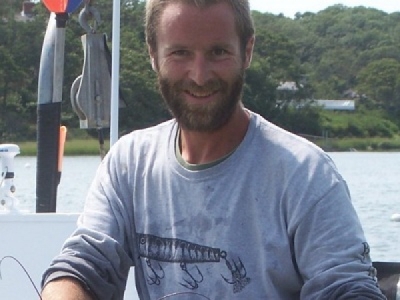
Posted on September 4, 2018
Watching Garrett Loparto unload tub after tub from his lobster boat at Mill Pond landing last week, you might have thought that all was well in his world. Think again.
Silting in the Nauset Estuary, which Loparto and other Orleans fishermen must navigate to reach the inlet to the ocean, is “why I have to fish out of a slow boat, so I can lift my motor out,” he said. “All the other guys have 32- to 35-footers with inboards. They’re very restricted.”
Loparto, who started helping out on his father’s boat at age 6, would like to see more attention paid to the estuary. “They will bend over backwards for Rock Harbor,” he said.
Fishermen have been agitating for a dredging project for years, and the town has responded by hiring Woods Hole Group to create a plan for obtaining permits and carrying out the work. Two fishermen attended the Aug. 22 selectmen’s meeting to call for emergency action.
Holding up a copy of that week’s Cape Cod Chronicle that reported Chatham has approval for emergency dredging in main access channel to Chatham Harbor, Mike Naughton told the Orleans board that it needed to act now.
“The harbor is sealing up,” he said. “Eastham is strangling us with sand. We need to do something collectively, probably with Eastham. With a self-sustaining dredge, we can make money selling sand and managing our resources.” Steve Smith said other communities are acquiring emergency permits and called for creation of a dredging committee “to get us all organized.”
Later in the meeting, as selectmen discussed plans for rebuilding the dune at Nauset Beach, Selectman Mark Mathison referred back to “the group of fishermen who talked about how bad it is in Nauset Estuary. Having been out there this summer, I can attest to that. I’ve been running that inlet since 1974, and it’s never been as bad as it is now.” He drew a connection between the need to get sand out of the estuary and to get sand to Nauset Beach to build up the dunes. That, he said, “would be much more sustainable and beneficial to the town” instead of trucking sand in from elsewhere.
“We have been working on the Nauset Estuary dredging project,” said Leslie Fields of Woods Hole Group. “Unfortunately, the timing of when that could occur is not fast enough to help at Nauset Beach, at least during this first phase. We’re talking about permits for emergency dredging. We’ve been in contact with Chatham. We’ve called (Director of Coastal Resources) Ted Keon in Chatham to see what he’s doing. We’re keeping our fingers on the pulse of what’s going on.”
The Nauset Estuary and Chatham projects are “totally different,” Fields said, and the former could not be done under emergency permits. “In Chatham, they’re dredging a very small portion of barrier beach on the south side of the inlet to allow boats to get in and out. They already have permits to dredge the channel in Pleasant Bay, so they’re asking for an emergency permit to dredge a very small part.” Also, Fields said, Chatham’s proposed work is in the Cape Cod National Seashore, “but they’re not proposing to dispose of it in the National Seashore. That makes our project at Nauset Beach more difficult.”
After learning from Fields that the Seashore is rebuilding Herring Cove in Provincetown with on-site sand, Mathison said, “They’re moving sand around to save that beach, but they won’t let us do similar things here. We can’t dredge sand out of our estuary because we’re in the Seashore boundaries, but they can do whatever they want at Herring Cove.”
Natural Resources Manager Nate Sears pointed out that using dredged spoils to re-nourish Nauset would require a full federal permit process and could not be done on an emergency basis.
“The fact that our commercial fleet can’t get out or in in that one small area is not an emergency?” Mathison asked rhetorically. “It’s not just one small area,” Fields said.
Noting that boats have used Mill Pond as a harbor of refuge during storms, Mathison said, “They can’t get there anymore. If we could expedite some kind of dredging there, it would help us with the sand there.”
“I share your desire to make the two (projects) align,” Fields said.
Also last week, Mathison addressed amending the town’s capital improvement plan to include purchase of a dredge. “Our estuaries here and waterways are a huge, huge part of this town,” he said. “Having to depend on the county schedule and the equipment the county has is really detrimental to this town. By putting a dredge and associated costs into the capital plan, it gives us the flexibility to go that route if it makes sense to the town. If we don’t go that way, it doesn’t cost us anything.”
Earlier in the meeting, Selectmen Chair Alan McClennen said dredging would be on the board’s agenda Sept. 5. “Please come back,” he asked Naughton and Smith. “We will try to see what we can do.”
Source: The Cape Cod Chronicle





